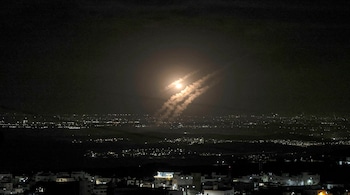Iran President Criticizes Israel’s Iron Dome as Fragile After Missile Attack
In a striking assertion following a significant missile attack on Israel, Iranian President Masoud Pezeshkian described Israel’s Iron Dome air defense system as “more fragile than glass.” This provocative statement comes after Iran launched over 180 missiles toward Israel on Tuesday, resulting in the death of one Palestinian man in the West Bank. Iran has claimed that 90% of these missiles successfully hit their designated targets, raising questions about the effectiveness of Israel’s much-vaunted defense system.
The Iron Dome, developed by Rafael Advanced Defense Systems and Israel Aerospace Industries, is a mobile all-weather air defense system designed to intercept and destroy short-range rockets and artillery shells fired from distances of 4 kilometers to 70 kilometers away. Since its deployment in 2011, the Iron Dome has been hailed as one of the most advanced and effective missile defense systems in the world. It uses radar-guided interceptors to detect and destroy incoming threats, boasting a claimed interception success rate of over 90%.
The latest barrage from Iran marks one of the largest and most coordinated missile attacks on Israel to date. According to Iranian sources, this offensive was a response to various Israeli actions in the region, including military operations in Syria and alleged assassinations of key figures allied with Iran. Despite the advanced capabilities of the Iron Dome, the sheer volume of missiles launched by Iran appears to have overwhelmed the system.
Israeli authorities reported that while many missiles were intercepted, the attack still caused significant damage in certain areas, primarily due to the sheer number of projectiles. The Iron Dome, designed to handle sporadic and smaller-scale attacks, faced unprecedented stress during this massive onslaught.
Iran’s claim that 90% of the missiles hit their intended targets starkly contrasts with Israel’s narrative, which emphasizes the Iron Dome’s interception success. The truth likely lies somewhere in between. While the Iron Dome’s capability to intercept incoming threats is not in doubt, the system was not designed to handle such a high volume of attacks simultaneously. This gap in capacity may have led to some missiles breaching the defense net.
Iranian President Masoud Pezeshkian’s remarks about the Iron Dome being “more fragile than glass” aim to portray Israel’s defense systems as inadequate and vulnerable. This rhetoric is part of a broader strategy to undermine Israel’s perceived military superiority and to boost Iranian morale.
The success or failure of missile defense systems like the Iron Dome carries significant strategic implications. For Israel, maintaining a reliable and effective air defense is crucial not only for national security but also for public confidence. The Iron Dome has been a cornerstone of Israel’s defense strategy, providing a shield against frequent rocket attacks from Gaza and other hostile regions.
If the Iron Dome is perceived as vulnerable, it could embolden adversaries and lead to increased aggression. This perception could also influence Israel’s strategic calculations, potentially prompting a reevaluation of its defense posture and investment in more advanced or supplementary systems.
For Iran, highlighting the vulnerabilities of the Iron Dome serves multiple purposes. Domestically, it bolsters national pride and supports the government’s narrative of strength and resilience against a technologically superior foe. Regionally, it sends a message to allies and adversaries alike, showcasing its capabilities and willingness to challenge it directly.
The latest missile attack and the ensuing rhetoric from Iran must be understood within the broader context of the Middle Eastern geopolitical landscape. Tensions between Israel and Iran have been escalating for years, driven by ideological, political, and strategic differences. Iran’s support for proxy groups in Lebanon, Syria, and Gaza, coupled with Israel’s military operations against Iranian interests in the region, has created a volatile and often explosive environment.
The Iron Dome’s performance, therefore, is not just a matter of technological efficacy but a symbol of the ongoing conflict between these two nations. Any perceived weakness or failure can have far-reaching consequences, potentially altering the balance of power and influencing future engagements.
The recent Iranian missile attack on Israel and President Masoud Pezeshkian’s comments about the Iron Dome’s fragility underscore the intense and ongoing rivalry between these two nations. While the Iron Dome remains a critical component of Israel’s defense strategy, the sheer volume of the recent attack exposed potential vulnerabilities in the system.
As they continue to navigate this complex and dangerous landscape, the effectiveness of defensive and offensive capabilities will play a crucial role in shaping their strategies and outcomes. The Iron Dome, despite its strengths, may need further enhancements to address the evolving threats and ensure the safety and security of Israel in the face of persistent and sophisticated adversaries.

